Tesco's Organizational Culture: Employee Motivation and Success
VerifiedAdded on 2022/11/23
|11
|3583
|394
Report
AI Summary
This report examines the organizational culture of Tesco, a global retail giant, and its influence on various aspects of the business. It explores how Tesco's culture, encompassing aspects like team culture, change culture, and communication methodologies, impacts organizational effectiveness and employee motivation. The report delves into theoretical models, such as Edgar Schein's model, to understand the different levels of culture within Tesco. It analyzes how the company's values, artifacts, and assumed values contribute to employee engagement and overall success. Furthermore, the report highlights the crucial role of leadership in fostering a positive and motivating work environment, emphasizing the connection between culture and employee performance. The analysis underscores how Tesco leverages its culture to adapt to changes, foster teamwork, and achieve its business objectives, ultimately enhancing its competitive advantage in the market. The report concludes by emphasizing the importance of a well-defined and managed organizational culture for sustained success.
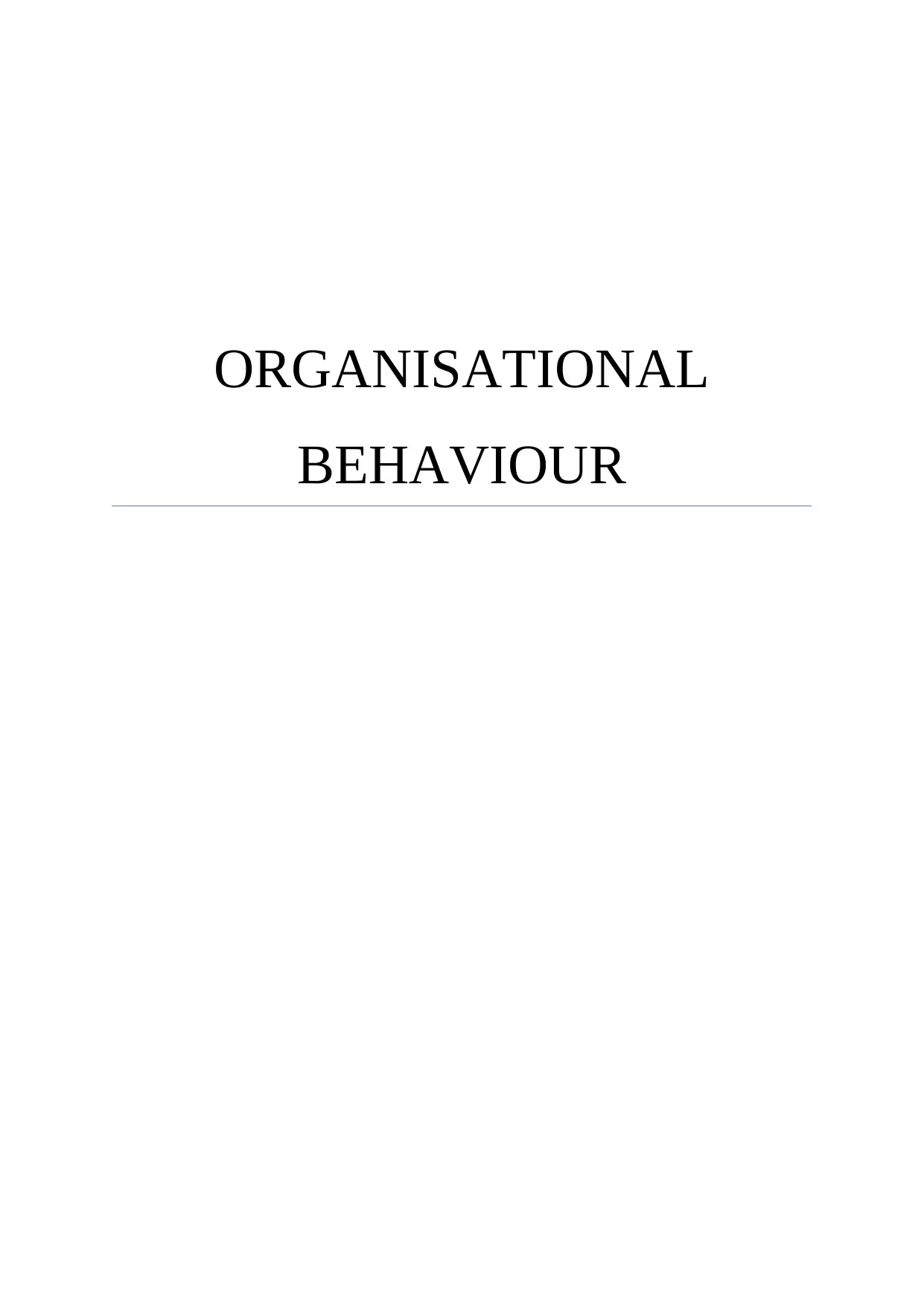
ORGANISATIONAL
BEHAVIOUR
BEHAVIOUR
Paraphrase This Document
Need a fresh take? Get an instant paraphrase of this document with our AI Paraphraser
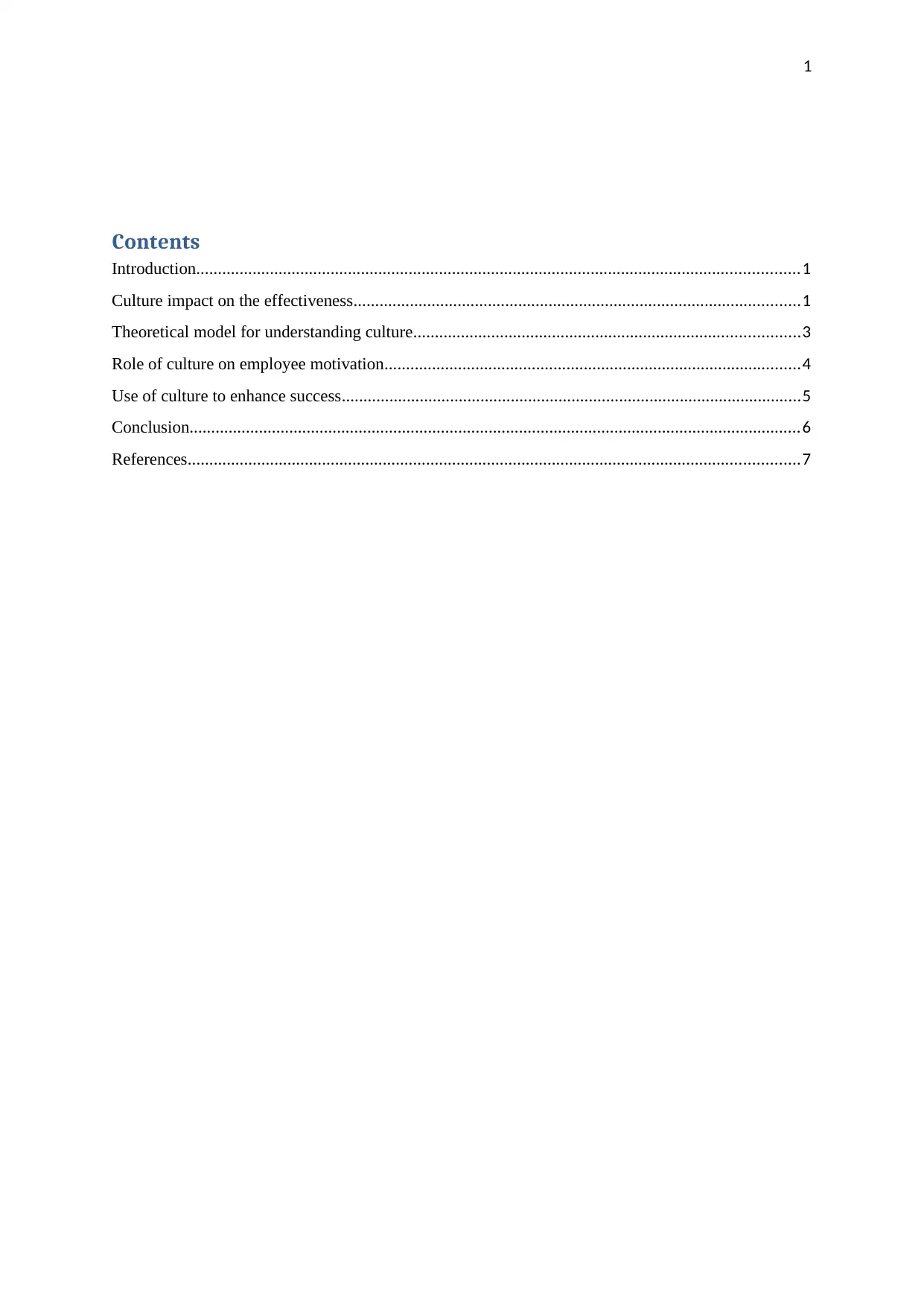
1
Contents
Introduction...........................................................................................................................................1
Culture impact on the effectiveness.......................................................................................................1
Theoretical model for understanding culture.........................................................................................3
Role of culture on employee motivation................................................................................................4
Use of culture to enhance success..........................................................................................................5
Conclusion.............................................................................................................................................6
References.............................................................................................................................................7
Contents
Introduction...........................................................................................................................................1
Culture impact on the effectiveness.......................................................................................................1
Theoretical model for understanding culture.........................................................................................3
Role of culture on employee motivation................................................................................................4
Use of culture to enhance success..........................................................................................................5
Conclusion.............................................................................................................................................6
References.............................................................................................................................................7
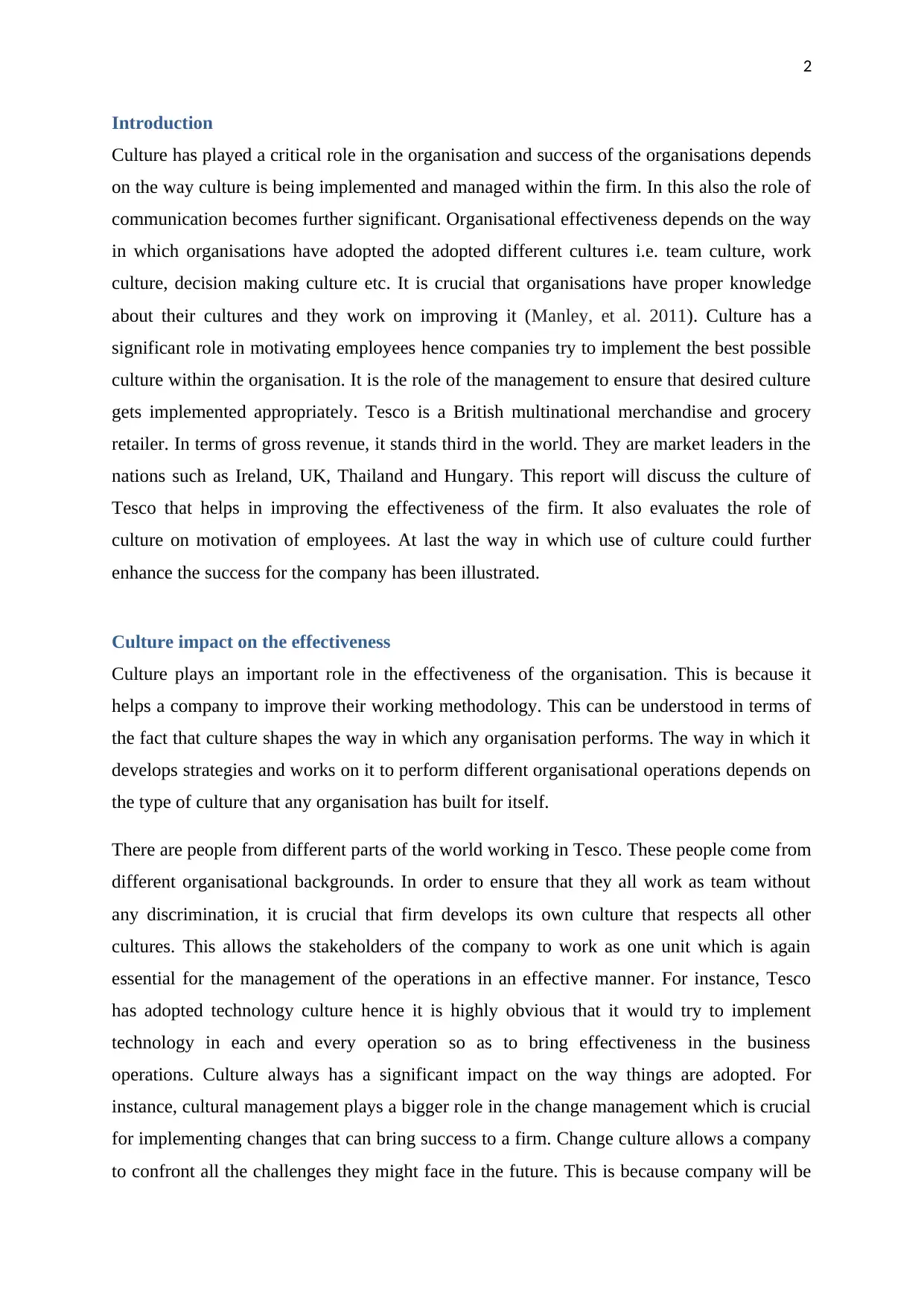
2
Introduction
Culture has played a critical role in the organisation and success of the organisations depends
on the way culture is being implemented and managed within the firm. In this also the role of
communication becomes further significant. Organisational effectiveness depends on the way
in which organisations have adopted the adopted different cultures i.e. team culture, work
culture, decision making culture etc. It is crucial that organisations have proper knowledge
about their cultures and they work on improving it (Manley, et al. 2011). Culture has a
significant role in motivating employees hence companies try to implement the best possible
culture within the organisation. It is the role of the management to ensure that desired culture
gets implemented appropriately. Tesco is a British multinational merchandise and grocery
retailer. In terms of gross revenue, it stands third in the world. They are market leaders in the
nations such as Ireland, UK, Thailand and Hungary. This report will discuss the culture of
Tesco that helps in improving the effectiveness of the firm. It also evaluates the role of
culture on motivation of employees. At last the way in which use of culture could further
enhance the success for the company has been illustrated.
Culture impact on the effectiveness
Culture plays an important role in the effectiveness of the organisation. This is because it
helps a company to improve their working methodology. This can be understood in terms of
the fact that culture shapes the way in which any organisation performs. The way in which it
develops strategies and works on it to perform different organisational operations depends on
the type of culture that any organisation has built for itself.
There are people from different parts of the world working in Tesco. These people come from
different organisational backgrounds. In order to ensure that they all work as team without
any discrimination, it is crucial that firm develops its own culture that respects all other
cultures. This allows the stakeholders of the company to work as one unit which is again
essential for the management of the operations in an effective manner. For instance, Tesco
has adopted technology culture hence it is highly obvious that it would try to implement
technology in each and every operation so as to bring effectiveness in the business
operations. Culture always has a significant impact on the way things are adopted. For
instance, cultural management plays a bigger role in the change management which is crucial
for implementing changes that can bring success to a firm. Change culture allows a company
to confront all the challenges they might face in the future. This is because company will be
Introduction
Culture has played a critical role in the organisation and success of the organisations depends
on the way culture is being implemented and managed within the firm. In this also the role of
communication becomes further significant. Organisational effectiveness depends on the way
in which organisations have adopted the adopted different cultures i.e. team culture, work
culture, decision making culture etc. It is crucial that organisations have proper knowledge
about their cultures and they work on improving it (Manley, et al. 2011). Culture has a
significant role in motivating employees hence companies try to implement the best possible
culture within the organisation. It is the role of the management to ensure that desired culture
gets implemented appropriately. Tesco is a British multinational merchandise and grocery
retailer. In terms of gross revenue, it stands third in the world. They are market leaders in the
nations such as Ireland, UK, Thailand and Hungary. This report will discuss the culture of
Tesco that helps in improving the effectiveness of the firm. It also evaluates the role of
culture on motivation of employees. At last the way in which use of culture could further
enhance the success for the company has been illustrated.
Culture impact on the effectiveness
Culture plays an important role in the effectiveness of the organisation. This is because it
helps a company to improve their working methodology. This can be understood in terms of
the fact that culture shapes the way in which any organisation performs. The way in which it
develops strategies and works on it to perform different organisational operations depends on
the type of culture that any organisation has built for itself.
There are people from different parts of the world working in Tesco. These people come from
different organisational backgrounds. In order to ensure that they all work as team without
any discrimination, it is crucial that firm develops its own culture that respects all other
cultures. This allows the stakeholders of the company to work as one unit which is again
essential for the management of the operations in an effective manner. For instance, Tesco
has adopted technology culture hence it is highly obvious that it would try to implement
technology in each and every operation so as to bring effectiveness in the business
operations. Culture always has a significant impact on the way things are adopted. For
instance, cultural management plays a bigger role in the change management which is crucial
for implementing changes that can bring success to a firm. Change culture allows a company
to confront all the challenges they might face in the future. This is because company will be
⊘ This is a preview!⊘
Do you want full access?
Subscribe today to unlock all pages.

Trusted by 1+ million students worldwide
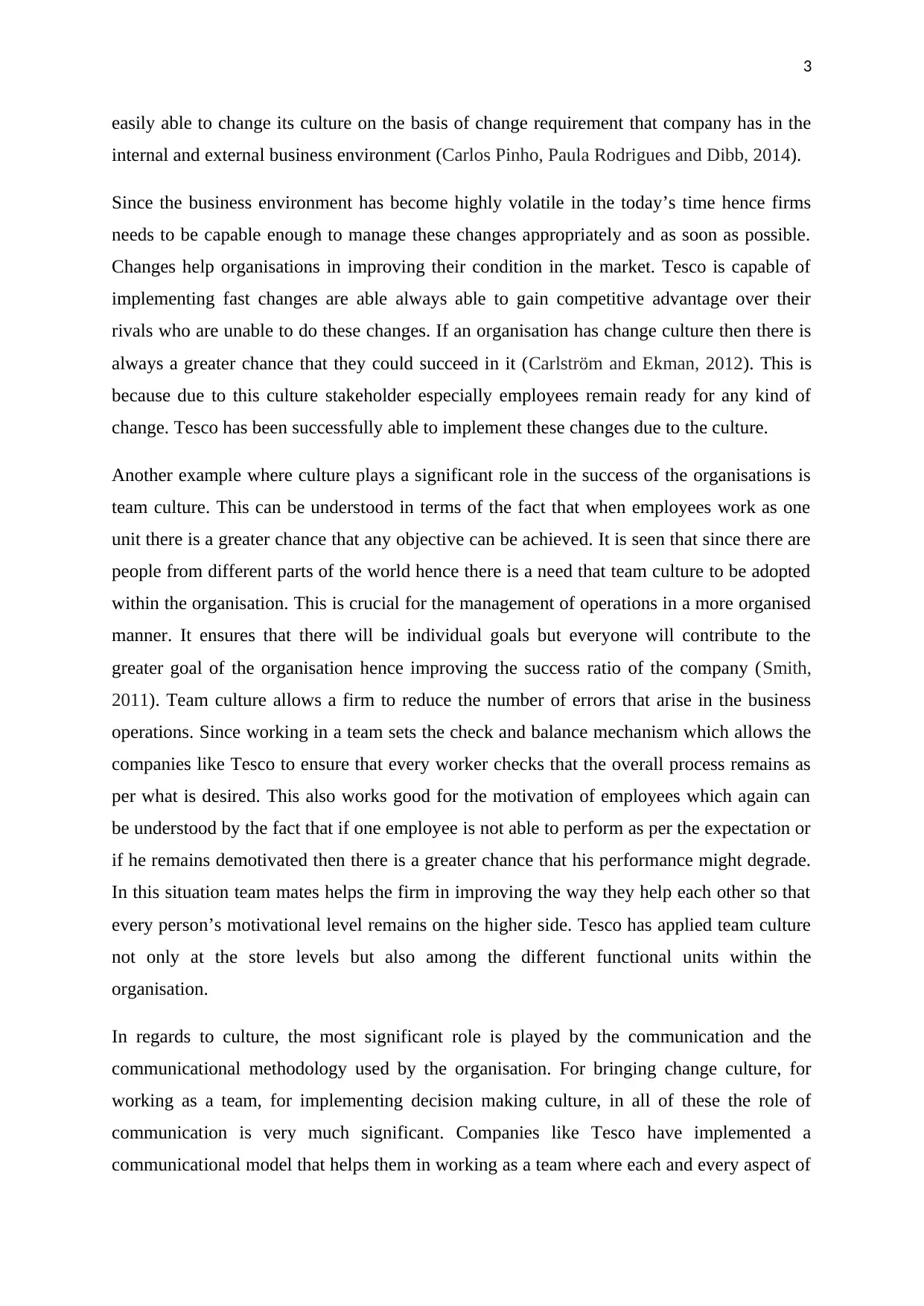
3
easily able to change its culture on the basis of change requirement that company has in the
internal and external business environment (Carlos Pinho, Paula Rodrigues and Dibb, 2014).
Since the business environment has become highly volatile in the today’s time hence firms
needs to be capable enough to manage these changes appropriately and as soon as possible.
Changes help organisations in improving their condition in the market. Tesco is capable of
implementing fast changes are able always able to gain competitive advantage over their
rivals who are unable to do these changes. If an organisation has change culture then there is
always a greater chance that they could succeed in it (Carlström and Ekman, 2012). This is
because due to this culture stakeholder especially employees remain ready for any kind of
change. Tesco has been successfully able to implement these changes due to the culture.
Another example where culture plays a significant role in the success of the organisations is
team culture. This can be understood in terms of the fact that when employees work as one
unit there is a greater chance that any objective can be achieved. It is seen that since there are
people from different parts of the world hence there is a need that team culture to be adopted
within the organisation. This is crucial for the management of operations in a more organised
manner. It ensures that there will be individual goals but everyone will contribute to the
greater goal of the organisation hence improving the success ratio of the company (Smith,
2011). Team culture allows a firm to reduce the number of errors that arise in the business
operations. Since working in a team sets the check and balance mechanism which allows the
companies like Tesco to ensure that every worker checks that the overall process remains as
per what is desired. This also works good for the motivation of employees which again can
be understood by the fact that if one employee is not able to perform as per the expectation or
if he remains demotivated then there is a greater chance that his performance might degrade.
In this situation team mates helps the firm in improving the way they help each other so that
every person’s motivational level remains on the higher side. Tesco has applied team culture
not only at the store levels but also among the different functional units within the
organisation.
In regards to culture, the most significant role is played by the communication and the
communicational methodology used by the organisation. For bringing change culture, for
working as a team, for implementing decision making culture, in all of these the role of
communication is very much significant. Companies like Tesco have implemented a
communicational model that helps them in working as a team where each and every aspect of
easily able to change its culture on the basis of change requirement that company has in the
internal and external business environment (Carlos Pinho, Paula Rodrigues and Dibb, 2014).
Since the business environment has become highly volatile in the today’s time hence firms
needs to be capable enough to manage these changes appropriately and as soon as possible.
Changes help organisations in improving their condition in the market. Tesco is capable of
implementing fast changes are able always able to gain competitive advantage over their
rivals who are unable to do these changes. If an organisation has change culture then there is
always a greater chance that they could succeed in it (Carlström and Ekman, 2012). This is
because due to this culture stakeholder especially employees remain ready for any kind of
change. Tesco has been successfully able to implement these changes due to the culture.
Another example where culture plays a significant role in the success of the organisations is
team culture. This can be understood in terms of the fact that when employees work as one
unit there is a greater chance that any objective can be achieved. It is seen that since there are
people from different parts of the world hence there is a need that team culture to be adopted
within the organisation. This is crucial for the management of operations in a more organised
manner. It ensures that there will be individual goals but everyone will contribute to the
greater goal of the organisation hence improving the success ratio of the company (Smith,
2011). Team culture allows a firm to reduce the number of errors that arise in the business
operations. Since working in a team sets the check and balance mechanism which allows the
companies like Tesco to ensure that every worker checks that the overall process remains as
per what is desired. This also works good for the motivation of employees which again can
be understood by the fact that if one employee is not able to perform as per the expectation or
if he remains demotivated then there is a greater chance that his performance might degrade.
In this situation team mates helps the firm in improving the way they help each other so that
every person’s motivational level remains on the higher side. Tesco has applied team culture
not only at the store levels but also among the different functional units within the
organisation.
In regards to culture, the most significant role is played by the communication and the
communicational methodology used by the organisation. For bringing change culture, for
working as a team, for implementing decision making culture, in all of these the role of
communication is very much significant. Companies like Tesco have implemented a
communicational model that helps them in working as a team where each and every aspect of
Paraphrase This Document
Need a fresh take? Get an instant paraphrase of this document with our AI Paraphraser
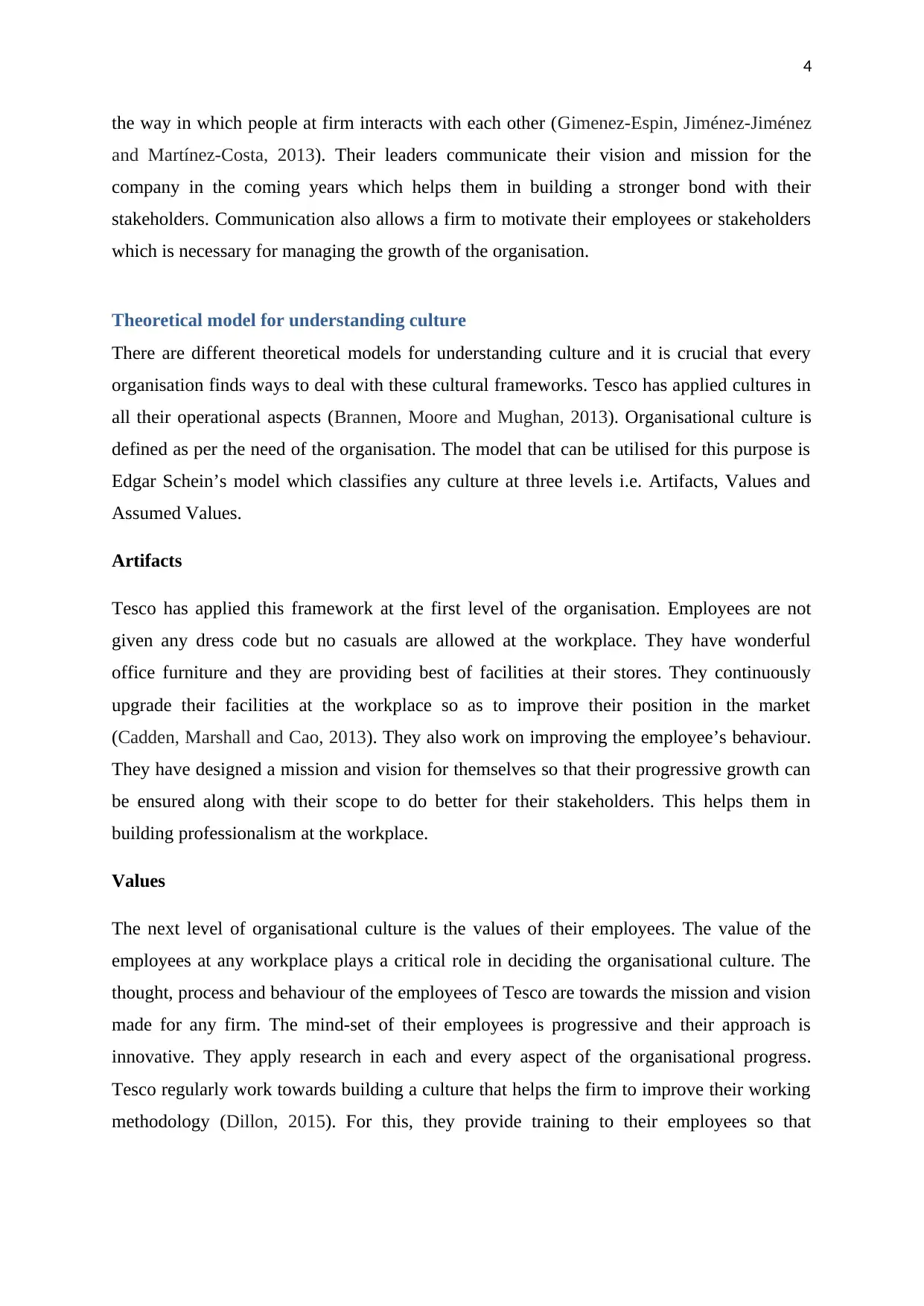
4
the way in which people at firm interacts with each other (Gimenez-Espin, Jiménez-Jiménez
and Martínez-Costa, 2013). Their leaders communicate their vision and mission for the
company in the coming years which helps them in building a stronger bond with their
stakeholders. Communication also allows a firm to motivate their employees or stakeholders
which is necessary for managing the growth of the organisation.
Theoretical model for understanding culture
There are different theoretical models for understanding culture and it is crucial that every
organisation finds ways to deal with these cultural frameworks. Tesco has applied cultures in
all their operational aspects (Brannen, Moore and Mughan, 2013). Organisational culture is
defined as per the need of the organisation. The model that can be utilised for this purpose is
Edgar Schein’s model which classifies any culture at three levels i.e. Artifacts, Values and
Assumed Values.
Artifacts
Tesco has applied this framework at the first level of the organisation. Employees are not
given any dress code but no casuals are allowed at the workplace. They have wonderful
office furniture and they are providing best of facilities at their stores. They continuously
upgrade their facilities at the workplace so as to improve their position in the market
(Cadden, Marshall and Cao, 2013). They also work on improving the employee’s behaviour.
They have designed a mission and vision for themselves so that their progressive growth can
be ensured along with their scope to do better for their stakeholders. This helps them in
building professionalism at the workplace.
Values
The next level of organisational culture is the values of their employees. The value of the
employees at any workplace plays a critical role in deciding the organisational culture. The
thought, process and behaviour of the employees of Tesco are towards the mission and vision
made for any firm. The mind-set of their employees is progressive and their approach is
innovative. They apply research in each and every aspect of the organisational progress.
Tesco regularly work towards building a culture that helps the firm to improve their working
methodology (Dillon, 2015). For this, they provide training to their employees so that
the way in which people at firm interacts with each other (Gimenez-Espin, Jiménez-Jiménez
and Martínez-Costa, 2013). Their leaders communicate their vision and mission for the
company in the coming years which helps them in building a stronger bond with their
stakeholders. Communication also allows a firm to motivate their employees or stakeholders
which is necessary for managing the growth of the organisation.
Theoretical model for understanding culture
There are different theoretical models for understanding culture and it is crucial that every
organisation finds ways to deal with these cultural frameworks. Tesco has applied cultures in
all their operational aspects (Brannen, Moore and Mughan, 2013). Organisational culture is
defined as per the need of the organisation. The model that can be utilised for this purpose is
Edgar Schein’s model which classifies any culture at three levels i.e. Artifacts, Values and
Assumed Values.
Artifacts
Tesco has applied this framework at the first level of the organisation. Employees are not
given any dress code but no casuals are allowed at the workplace. They have wonderful
office furniture and they are providing best of facilities at their stores. They continuously
upgrade their facilities at the workplace so as to improve their position in the market
(Cadden, Marshall and Cao, 2013). They also work on improving the employee’s behaviour.
They have designed a mission and vision for themselves so that their progressive growth can
be ensured along with their scope to do better for their stakeholders. This helps them in
building professionalism at the workplace.
Values
The next level of organisational culture is the values of their employees. The value of the
employees at any workplace plays a critical role in deciding the organisational culture. The
thought, process and behaviour of the employees of Tesco are towards the mission and vision
made for any firm. The mind-set of their employees is progressive and their approach is
innovative. They apply research in each and every aspect of the organisational progress.
Tesco regularly work towards building a culture that helps the firm to improve their working
methodology (Dillon, 2015). For this, they provide training to their employees so that
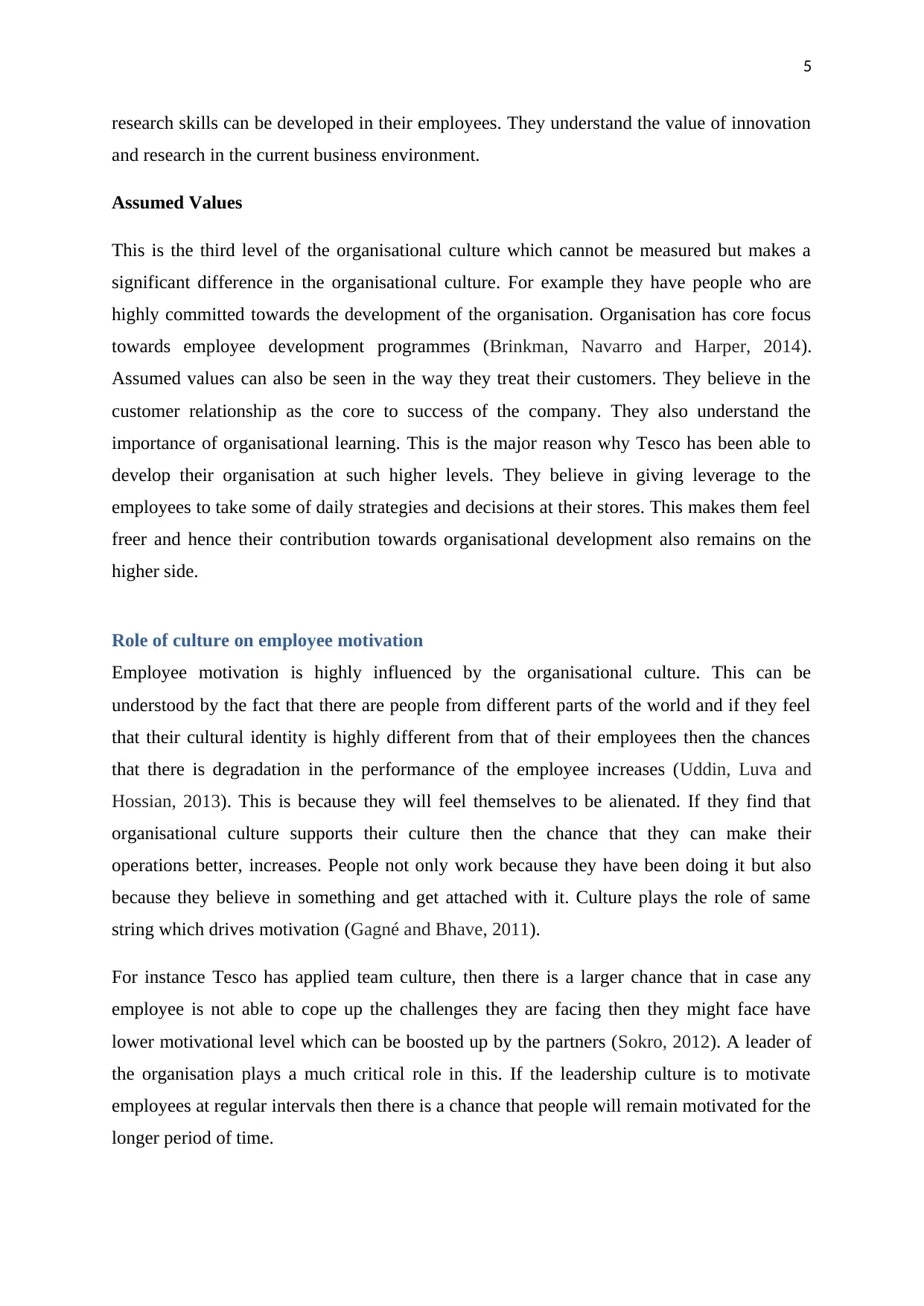
5
research skills can be developed in their employees. They understand the value of innovation
and research in the current business environment.
Assumed Values
This is the third level of the organisational culture which cannot be measured but makes a
significant difference in the organisational culture. For example they have people who are
highly committed towards the development of the organisation. Organisation has core focus
towards employee development programmes (Brinkman, Navarro and Harper, 2014).
Assumed values can also be seen in the way they treat their customers. They believe in the
customer relationship as the core to success of the company. They also understand the
importance of organisational learning. This is the major reason why Tesco has been able to
develop their organisation at such higher levels. They believe in giving leverage to the
employees to take some of daily strategies and decisions at their stores. This makes them feel
freer and hence their contribution towards organisational development also remains on the
higher side.
Role of culture on employee motivation
Employee motivation is highly influenced by the organisational culture. This can be
understood by the fact that there are people from different parts of the world and if they feel
that their cultural identity is highly different from that of their employees then the chances
that there is degradation in the performance of the employee increases (Uddin, Luva and
Hossian, 2013). This is because they will feel themselves to be alienated. If they find that
organisational culture supports their culture then the chance that they can make their
operations better, increases. People not only work because they have been doing it but also
because they believe in something and get attached with it. Culture plays the role of same
string which drives motivation (Gagné and Bhave, 2011).
For instance Tesco has applied team culture, then there is a larger chance that in case any
employee is not able to cope up the challenges they are facing then they might face have
lower motivational level which can be boosted up by the partners (Sokro, 2012). A leader of
the organisation plays a much critical role in this. If the leadership culture is to motivate
employees at regular intervals then there is a chance that people will remain motivated for the
longer period of time.
research skills can be developed in their employees. They understand the value of innovation
and research in the current business environment.
Assumed Values
This is the third level of the organisational culture which cannot be measured but makes a
significant difference in the organisational culture. For example they have people who are
highly committed towards the development of the organisation. Organisation has core focus
towards employee development programmes (Brinkman, Navarro and Harper, 2014).
Assumed values can also be seen in the way they treat their customers. They believe in the
customer relationship as the core to success of the company. They also understand the
importance of organisational learning. This is the major reason why Tesco has been able to
develop their organisation at such higher levels. They believe in giving leverage to the
employees to take some of daily strategies and decisions at their stores. This makes them feel
freer and hence their contribution towards organisational development also remains on the
higher side.
Role of culture on employee motivation
Employee motivation is highly influenced by the organisational culture. This can be
understood by the fact that there are people from different parts of the world and if they feel
that their cultural identity is highly different from that of their employees then the chances
that there is degradation in the performance of the employee increases (Uddin, Luva and
Hossian, 2013). This is because they will feel themselves to be alienated. If they find that
organisational culture supports their culture then the chance that they can make their
operations better, increases. People not only work because they have been doing it but also
because they believe in something and get attached with it. Culture plays the role of same
string which drives motivation (Gagné and Bhave, 2011).
For instance Tesco has applied team culture, then there is a larger chance that in case any
employee is not able to cope up the challenges they are facing then they might face have
lower motivational level which can be boosted up by the partners (Sokro, 2012). A leader of
the organisation plays a much critical role in this. If the leadership culture is to motivate
employees at regular intervals then there is a chance that people will remain motivated for the
longer period of time.
⊘ This is a preview!⊘
Do you want full access?
Subscribe today to unlock all pages.

Trusted by 1+ million students worldwide
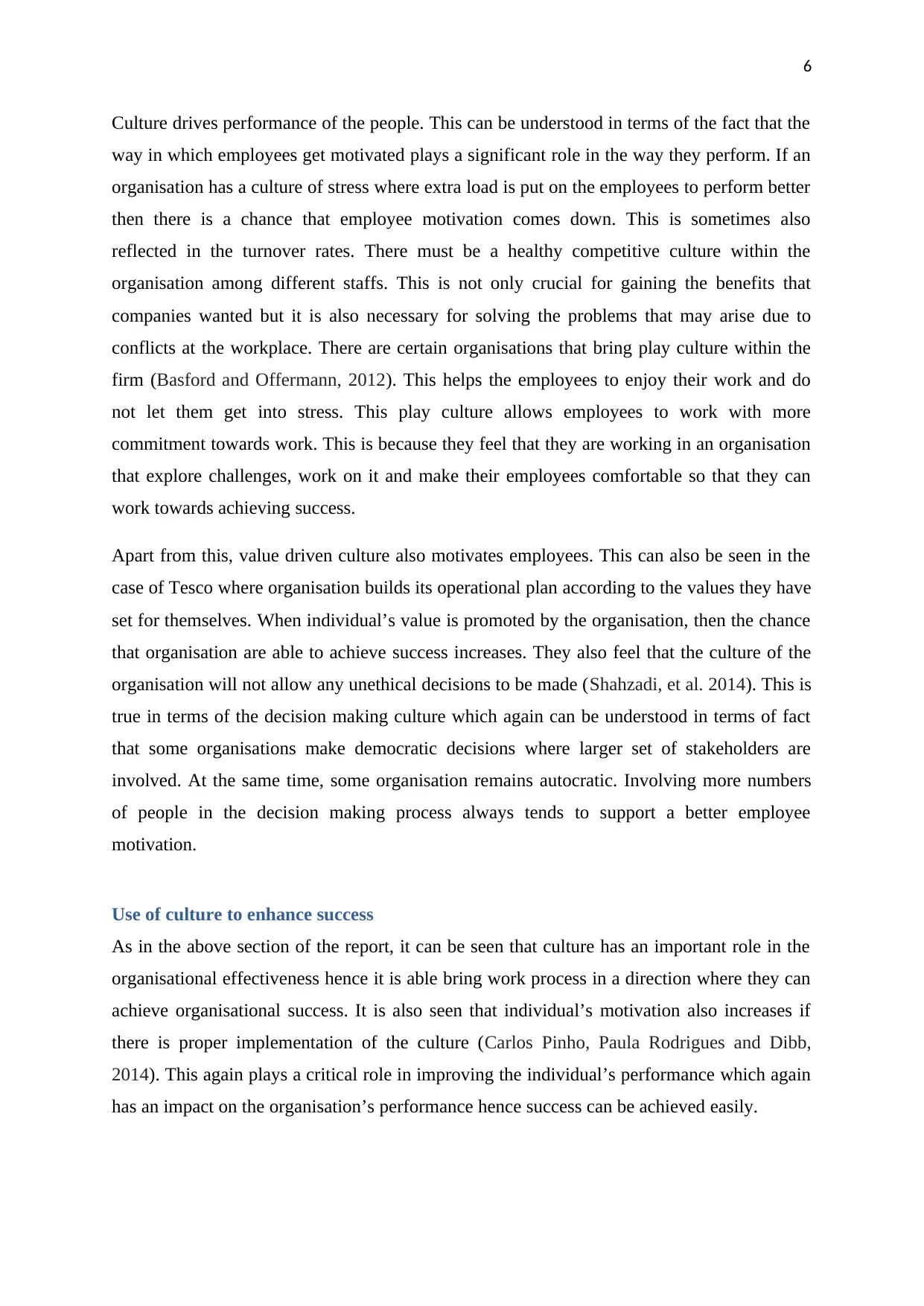
6
Culture drives performance of the people. This can be understood in terms of the fact that the
way in which employees get motivated plays a significant role in the way they perform. If an
organisation has a culture of stress where extra load is put on the employees to perform better
then there is a chance that employee motivation comes down. This is sometimes also
reflected in the turnover rates. There must be a healthy competitive culture within the
organisation among different staffs. This is not only crucial for gaining the benefits that
companies wanted but it is also necessary for solving the problems that may arise due to
conflicts at the workplace. There are certain organisations that bring play culture within the
firm (Basford and Offermann, 2012). This helps the employees to enjoy their work and do
not let them get into stress. This play culture allows employees to work with more
commitment towards work. This is because they feel that they are working in an organisation
that explore challenges, work on it and make their employees comfortable so that they can
work towards achieving success.
Apart from this, value driven culture also motivates employees. This can also be seen in the
case of Tesco where organisation builds its operational plan according to the values they have
set for themselves. When individual’s value is promoted by the organisation, then the chance
that organisation are able to achieve success increases. They also feel that the culture of the
organisation will not allow any unethical decisions to be made (Shahzadi, et al. 2014). This is
true in terms of the decision making culture which again can be understood in terms of fact
that some organisations make democratic decisions where larger set of stakeholders are
involved. At the same time, some organisation remains autocratic. Involving more numbers
of people in the decision making process always tends to support a better employee
motivation.
Use of culture to enhance success
As in the above section of the report, it can be seen that culture has an important role in the
organisational effectiveness hence it is able bring work process in a direction where they can
achieve organisational success. It is also seen that individual’s motivation also increases if
there is proper implementation of the culture (Carlos Pinho, Paula Rodrigues and Dibb,
2014). This again plays a critical role in improving the individual’s performance which again
has an impact on the organisation’s performance hence success can be achieved easily.
Culture drives performance of the people. This can be understood in terms of the fact that the
way in which employees get motivated plays a significant role in the way they perform. If an
organisation has a culture of stress where extra load is put on the employees to perform better
then there is a chance that employee motivation comes down. This is sometimes also
reflected in the turnover rates. There must be a healthy competitive culture within the
organisation among different staffs. This is not only crucial for gaining the benefits that
companies wanted but it is also necessary for solving the problems that may arise due to
conflicts at the workplace. There are certain organisations that bring play culture within the
firm (Basford and Offermann, 2012). This helps the employees to enjoy their work and do
not let them get into stress. This play culture allows employees to work with more
commitment towards work. This is because they feel that they are working in an organisation
that explore challenges, work on it and make their employees comfortable so that they can
work towards achieving success.
Apart from this, value driven culture also motivates employees. This can also be seen in the
case of Tesco where organisation builds its operational plan according to the values they have
set for themselves. When individual’s value is promoted by the organisation, then the chance
that organisation are able to achieve success increases. They also feel that the culture of the
organisation will not allow any unethical decisions to be made (Shahzadi, et al. 2014). This is
true in terms of the decision making culture which again can be understood in terms of fact
that some organisations make democratic decisions where larger set of stakeholders are
involved. At the same time, some organisation remains autocratic. Involving more numbers
of people in the decision making process always tends to support a better employee
motivation.
Use of culture to enhance success
As in the above section of the report, it can be seen that culture has an important role in the
organisational effectiveness hence it is able bring work process in a direction where they can
achieve organisational success. It is also seen that individual’s motivation also increases if
there is proper implementation of the culture (Carlos Pinho, Paula Rodrigues and Dibb,
2014). This again plays a critical role in improving the individual’s performance which again
has an impact on the organisation’s performance hence success can be achieved easily.
Paraphrase This Document
Need a fresh take? Get an instant paraphrase of this document with our AI Paraphraser
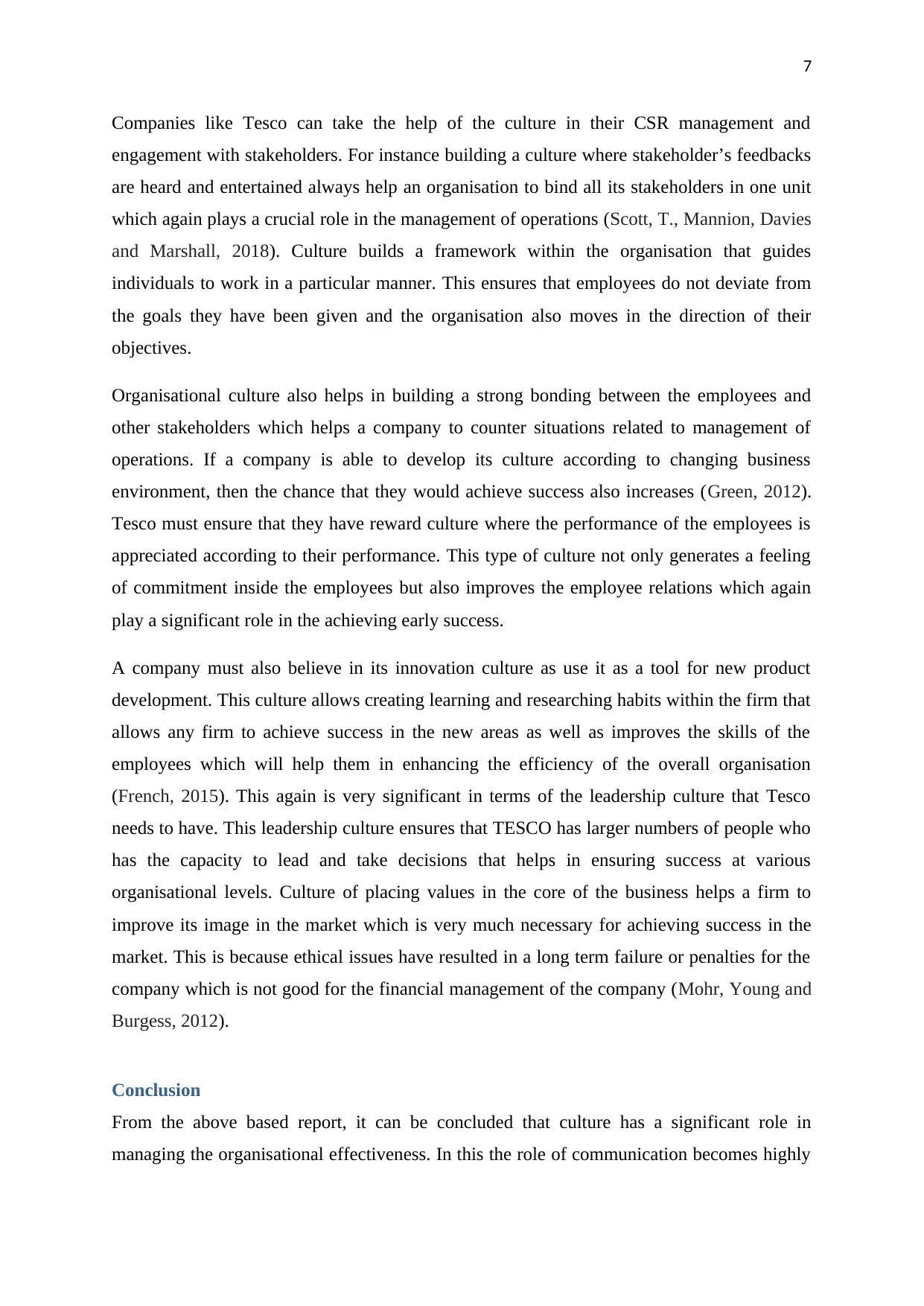
7
Companies like Tesco can take the help of the culture in their CSR management and
engagement with stakeholders. For instance building a culture where stakeholder’s feedbacks
are heard and entertained always help an organisation to bind all its stakeholders in one unit
which again plays a crucial role in the management of operations (Scott, T., Mannion, Davies
and Marshall, 2018). Culture builds a framework within the organisation that guides
individuals to work in a particular manner. This ensures that employees do not deviate from
the goals they have been given and the organisation also moves in the direction of their
objectives.
Organisational culture also helps in building a strong bonding between the employees and
other stakeholders which helps a company to counter situations related to management of
operations. If a company is able to develop its culture according to changing business
environment, then the chance that they would achieve success also increases (Green, 2012).
Tesco must ensure that they have reward culture where the performance of the employees is
appreciated according to their performance. This type of culture not only generates a feeling
of commitment inside the employees but also improves the employee relations which again
play a significant role in the achieving early success.
A company must also believe in its innovation culture as use it as a tool for new product
development. This culture allows creating learning and researching habits within the firm that
allows any firm to achieve success in the new areas as well as improves the skills of the
employees which will help them in enhancing the efficiency of the overall organisation
(French, 2015). This again is very significant in terms of the leadership culture that Tesco
needs to have. This leadership culture ensures that TESCO has larger numbers of people who
has the capacity to lead and take decisions that helps in ensuring success at various
organisational levels. Culture of placing values in the core of the business helps a firm to
improve its image in the market which is very much necessary for achieving success in the
market. This is because ethical issues have resulted in a long term failure or penalties for the
company which is not good for the financial management of the company (Mohr, Young and
Burgess, 2012).
Conclusion
From the above based report, it can be concluded that culture has a significant role in
managing the organisational effectiveness. In this the role of communication becomes highly
Companies like Tesco can take the help of the culture in their CSR management and
engagement with stakeholders. For instance building a culture where stakeholder’s feedbacks
are heard and entertained always help an organisation to bind all its stakeholders in one unit
which again plays a crucial role in the management of operations (Scott, T., Mannion, Davies
and Marshall, 2018). Culture builds a framework within the organisation that guides
individuals to work in a particular manner. This ensures that employees do not deviate from
the goals they have been given and the organisation also moves in the direction of their
objectives.
Organisational culture also helps in building a strong bonding between the employees and
other stakeholders which helps a company to counter situations related to management of
operations. If a company is able to develop its culture according to changing business
environment, then the chance that they would achieve success also increases (Green, 2012).
Tesco must ensure that they have reward culture where the performance of the employees is
appreciated according to their performance. This type of culture not only generates a feeling
of commitment inside the employees but also improves the employee relations which again
play a significant role in the achieving early success.
A company must also believe in its innovation culture as use it as a tool for new product
development. This culture allows creating learning and researching habits within the firm that
allows any firm to achieve success in the new areas as well as improves the skills of the
employees which will help them in enhancing the efficiency of the overall organisation
(French, 2015). This again is very significant in terms of the leadership culture that Tesco
needs to have. This leadership culture ensures that TESCO has larger numbers of people who
has the capacity to lead and take decisions that helps in ensuring success at various
organisational levels. Culture of placing values in the core of the business helps a firm to
improve its image in the market which is very much necessary for achieving success in the
market. This is because ethical issues have resulted in a long term failure or penalties for the
company which is not good for the financial management of the company (Mohr, Young and
Burgess, 2012).
Conclusion
From the above based report, it can be concluded that culture has a significant role in
managing the organisational effectiveness. In this the role of communication becomes highly
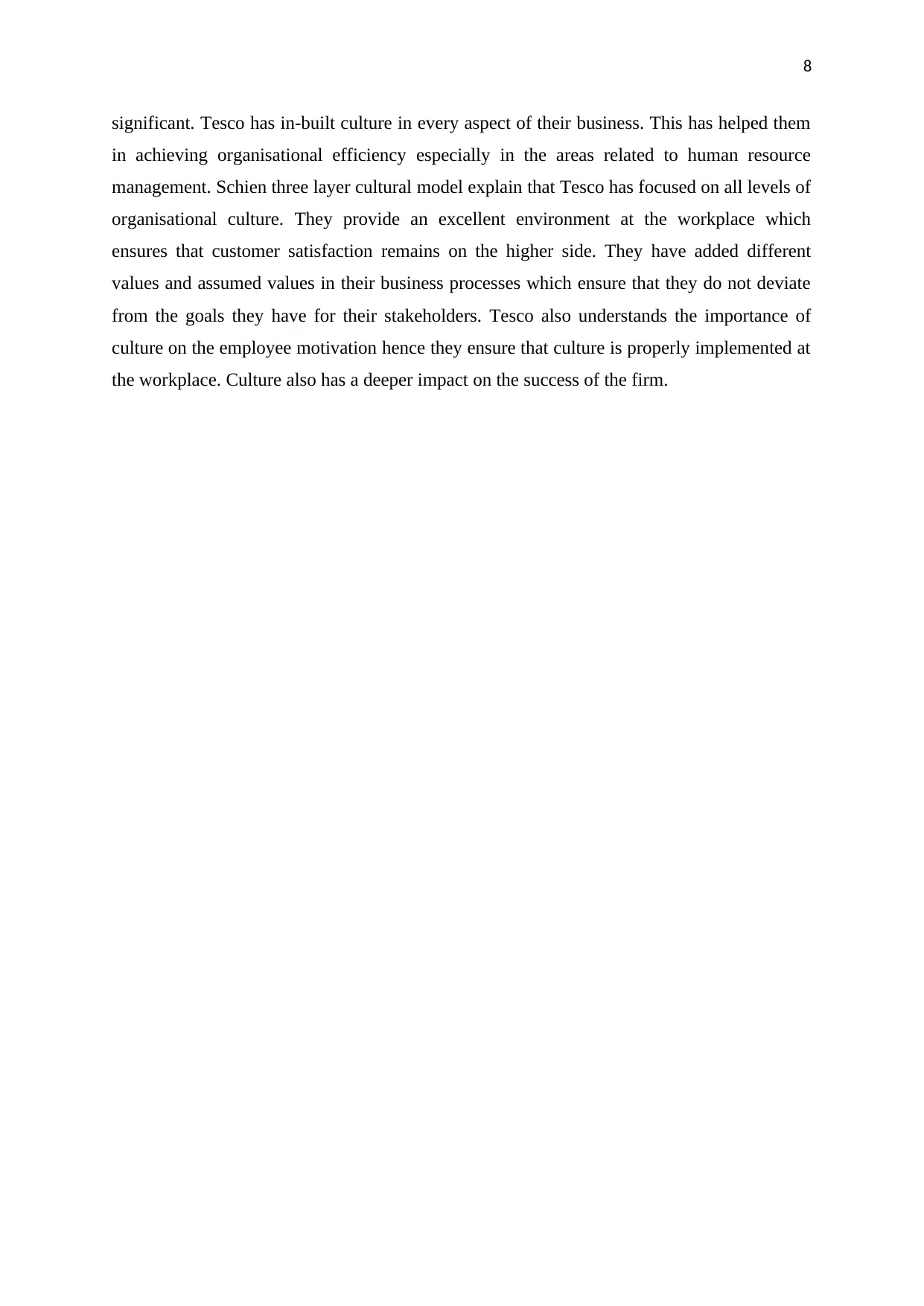
8
significant. Tesco has in-built culture in every aspect of their business. This has helped them
in achieving organisational efficiency especially in the areas related to human resource
management. Schien three layer cultural model explain that Tesco has focused on all levels of
organisational culture. They provide an excellent environment at the workplace which
ensures that customer satisfaction remains on the higher side. They have added different
values and assumed values in their business processes which ensure that they do not deviate
from the goals they have for their stakeholders. Tesco also understands the importance of
culture on the employee motivation hence they ensure that culture is properly implemented at
the workplace. Culture also has a deeper impact on the success of the firm.
significant. Tesco has in-built culture in every aspect of their business. This has helped them
in achieving organisational efficiency especially in the areas related to human resource
management. Schien three layer cultural model explain that Tesco has focused on all levels of
organisational culture. They provide an excellent environment at the workplace which
ensures that customer satisfaction remains on the higher side. They have added different
values and assumed values in their business processes which ensure that they do not deviate
from the goals they have for their stakeholders. Tesco also understands the importance of
culture on the employee motivation hence they ensure that culture is properly implemented at
the workplace. Culture also has a deeper impact on the success of the firm.
⊘ This is a preview!⊘
Do you want full access?
Subscribe today to unlock all pages.

Trusted by 1+ million students worldwide
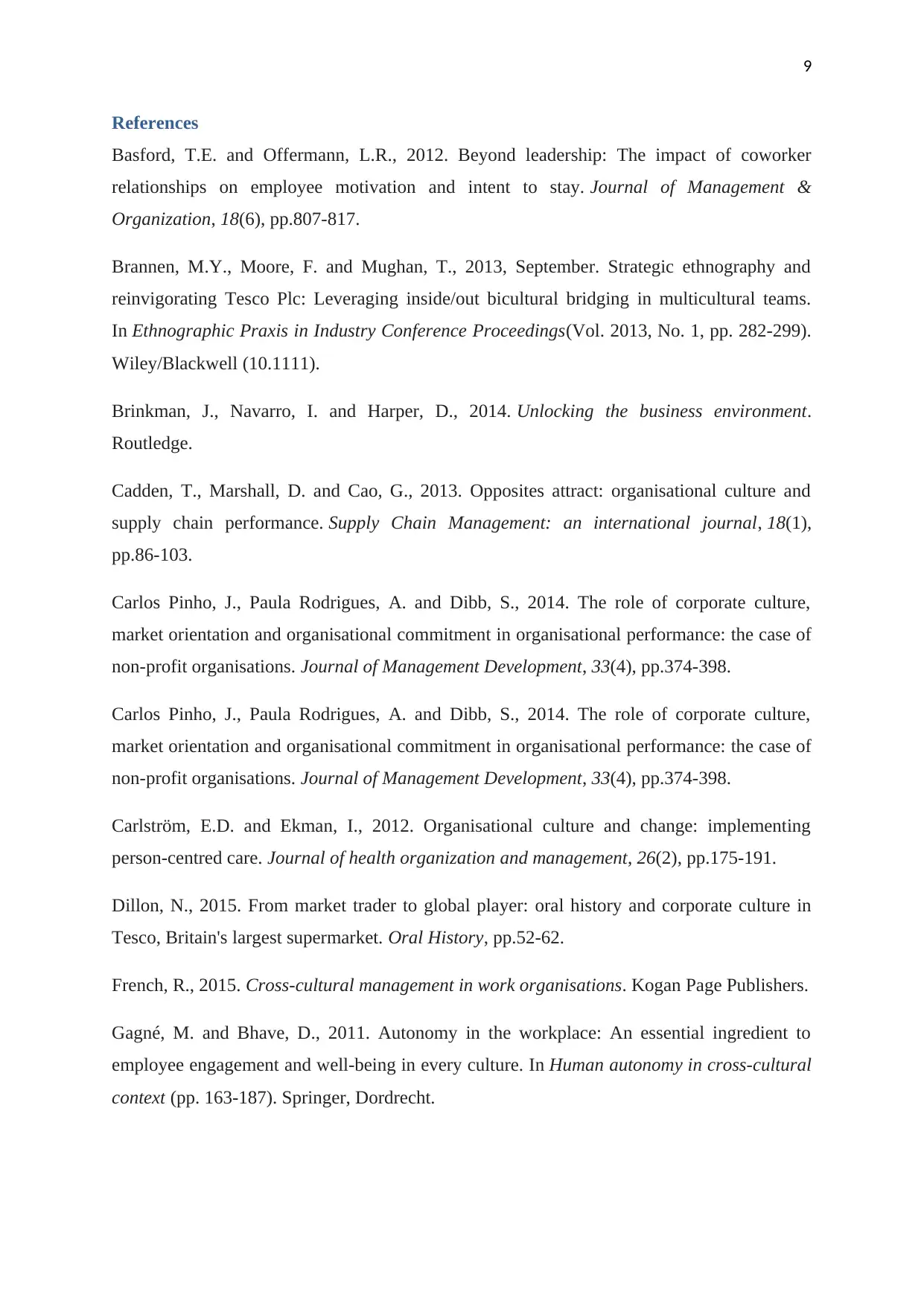
9
References
Basford, T.E. and Offermann, L.R., 2012. Beyond leadership: The impact of coworker
relationships on employee motivation and intent to stay. Journal of Management &
Organization, 18(6), pp.807-817.
Brannen, M.Y., Moore, F. and Mughan, T., 2013, September. Strategic ethnography and
reinvigorating Tesco Plc: Leveraging inside/out bicultural bridging in multicultural teams.
In Ethnographic Praxis in Industry Conference Proceedings(Vol. 2013, No. 1, pp. 282-299).
Wiley/Blackwell (10.1111).
Brinkman, J., Navarro, I. and Harper, D., 2014. Unlocking the business environment.
Routledge.
Cadden, T., Marshall, D. and Cao, G., 2013. Opposites attract: organisational culture and
supply chain performance. Supply Chain Management: an international journal, 18(1),
pp.86-103.
Carlos Pinho, J., Paula Rodrigues, A. and Dibb, S., 2014. The role of corporate culture,
market orientation and organisational commitment in organisational performance: the case of
non-profit organisations. Journal of Management Development, 33(4), pp.374-398.
Carlos Pinho, J., Paula Rodrigues, A. and Dibb, S., 2014. The role of corporate culture,
market orientation and organisational commitment in organisational performance: the case of
non-profit organisations. Journal of Management Development, 33(4), pp.374-398.
Carlström, E.D. and Ekman, I., 2012. Organisational culture and change: implementing
person-centred care. Journal of health organization and management, 26(2), pp.175-191.
Dillon, N., 2015. From market trader to global player: oral history and corporate culture in
Tesco, Britain's largest supermarket. Oral History, pp.52-62.
French, R., 2015. Cross-cultural management in work organisations. Kogan Page Publishers.
Gagné, M. and Bhave, D., 2011. Autonomy in the workplace: An essential ingredient to
employee engagement and well-being in every culture. In Human autonomy in cross-cultural
context (pp. 163-187). Springer, Dordrecht.
References
Basford, T.E. and Offermann, L.R., 2012. Beyond leadership: The impact of coworker
relationships on employee motivation and intent to stay. Journal of Management &
Organization, 18(6), pp.807-817.
Brannen, M.Y., Moore, F. and Mughan, T., 2013, September. Strategic ethnography and
reinvigorating Tesco Plc: Leveraging inside/out bicultural bridging in multicultural teams.
In Ethnographic Praxis in Industry Conference Proceedings(Vol. 2013, No. 1, pp. 282-299).
Wiley/Blackwell (10.1111).
Brinkman, J., Navarro, I. and Harper, D., 2014. Unlocking the business environment.
Routledge.
Cadden, T., Marshall, D. and Cao, G., 2013. Opposites attract: organisational culture and
supply chain performance. Supply Chain Management: an international journal, 18(1),
pp.86-103.
Carlos Pinho, J., Paula Rodrigues, A. and Dibb, S., 2014. The role of corporate culture,
market orientation and organisational commitment in organisational performance: the case of
non-profit organisations. Journal of Management Development, 33(4), pp.374-398.
Carlos Pinho, J., Paula Rodrigues, A. and Dibb, S., 2014. The role of corporate culture,
market orientation and organisational commitment in organisational performance: the case of
non-profit organisations. Journal of Management Development, 33(4), pp.374-398.
Carlström, E.D. and Ekman, I., 2012. Organisational culture and change: implementing
person-centred care. Journal of health organization and management, 26(2), pp.175-191.
Dillon, N., 2015. From market trader to global player: oral history and corporate culture in
Tesco, Britain's largest supermarket. Oral History, pp.52-62.
French, R., 2015. Cross-cultural management in work organisations. Kogan Page Publishers.
Gagné, M. and Bhave, D., 2011. Autonomy in the workplace: An essential ingredient to
employee engagement and well-being in every culture. In Human autonomy in cross-cultural
context (pp. 163-187). Springer, Dordrecht.
Paraphrase This Document
Need a fresh take? Get an instant paraphrase of this document with our AI Paraphraser
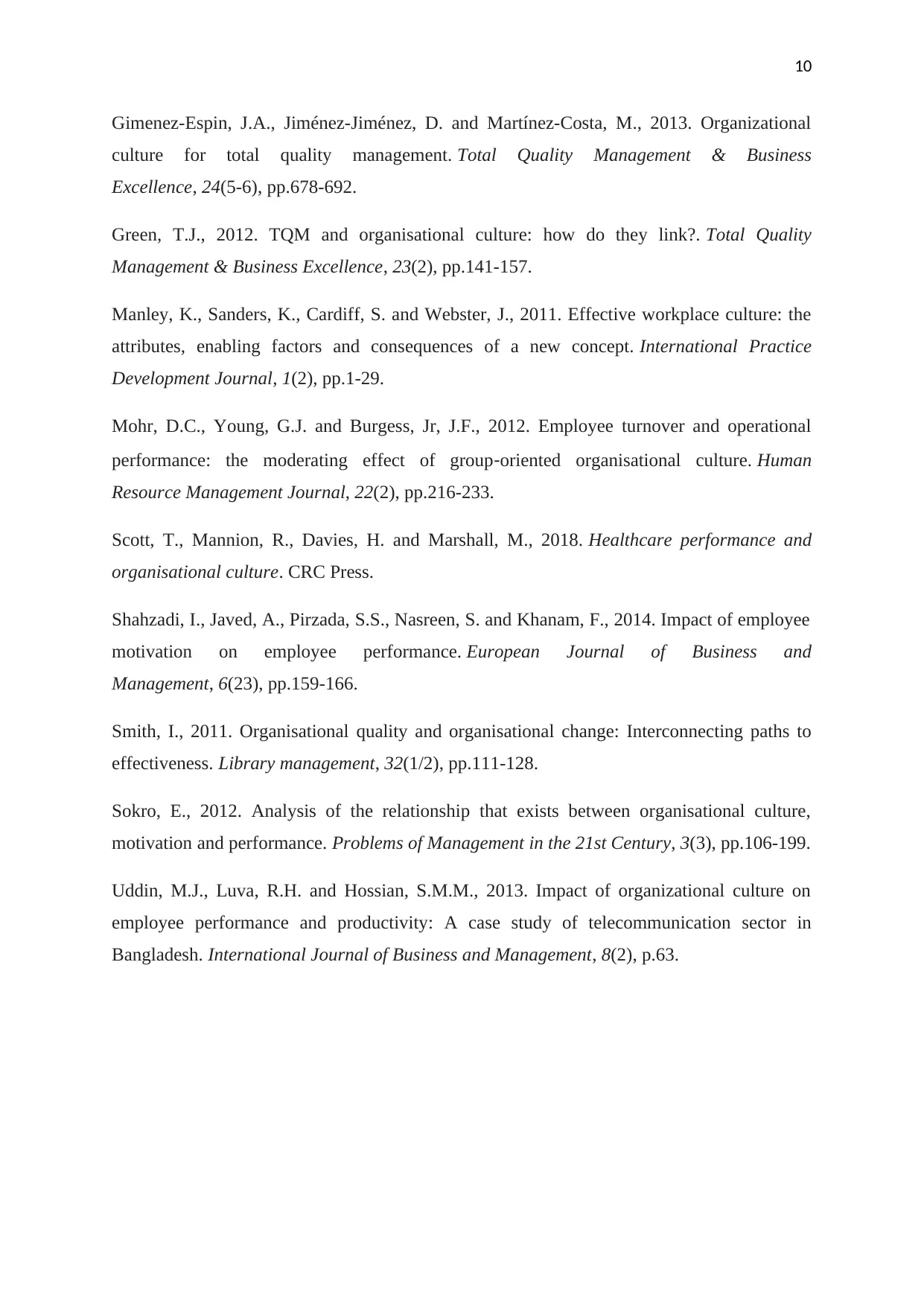
10
Gimenez-Espin, J.A., Jiménez-Jiménez, D. and Martínez-Costa, M., 2013. Organizational
culture for total quality management. Total Quality Management & Business
Excellence, 24(5-6), pp.678-692.
Green, T.J., 2012. TQM and organisational culture: how do they link?. Total Quality
Management & Business Excellence, 23(2), pp.141-157.
Manley, K., Sanders, K., Cardiff, S. and Webster, J., 2011. Effective workplace culture: the
attributes, enabling factors and consequences of a new concept. International Practice
Development Journal, 1(2), pp.1-29.
Mohr, D.C., Young, G.J. and Burgess, Jr, J.F., 2012. Employee turnover and operational
performance: the moderating effect of group‐oriented organisational culture. Human
Resource Management Journal, 22(2), pp.216-233.
Scott, T., Mannion, R., Davies, H. and Marshall, M., 2018. Healthcare performance and
organisational culture. CRC Press.
Shahzadi, I., Javed, A., Pirzada, S.S., Nasreen, S. and Khanam, F., 2014. Impact of employee
motivation on employee performance. European Journal of Business and
Management, 6(23), pp.159-166.
Smith, I., 2011. Organisational quality and organisational change: Interconnecting paths to
effectiveness. Library management, 32(1/2), pp.111-128.
Sokro, E., 2012. Analysis of the relationship that exists between organisational culture,
motivation and performance. Problems of Management in the 21st Century, 3(3), pp.106-199.
Uddin, M.J., Luva, R.H. and Hossian, S.M.M., 2013. Impact of organizational culture on
employee performance and productivity: A case study of telecommunication sector in
Bangladesh. International Journal of Business and Management, 8(2), p.63.
Gimenez-Espin, J.A., Jiménez-Jiménez, D. and Martínez-Costa, M., 2013. Organizational
culture for total quality management. Total Quality Management & Business
Excellence, 24(5-6), pp.678-692.
Green, T.J., 2012. TQM and organisational culture: how do they link?. Total Quality
Management & Business Excellence, 23(2), pp.141-157.
Manley, K., Sanders, K., Cardiff, S. and Webster, J., 2011. Effective workplace culture: the
attributes, enabling factors and consequences of a new concept. International Practice
Development Journal, 1(2), pp.1-29.
Mohr, D.C., Young, G.J. and Burgess, Jr, J.F., 2012. Employee turnover and operational
performance: the moderating effect of group‐oriented organisational culture. Human
Resource Management Journal, 22(2), pp.216-233.
Scott, T., Mannion, R., Davies, H. and Marshall, M., 2018. Healthcare performance and
organisational culture. CRC Press.
Shahzadi, I., Javed, A., Pirzada, S.S., Nasreen, S. and Khanam, F., 2014. Impact of employee
motivation on employee performance. European Journal of Business and
Management, 6(23), pp.159-166.
Smith, I., 2011. Organisational quality and organisational change: Interconnecting paths to
effectiveness. Library management, 32(1/2), pp.111-128.
Sokro, E., 2012. Analysis of the relationship that exists between organisational culture,
motivation and performance. Problems of Management in the 21st Century, 3(3), pp.106-199.
Uddin, M.J., Luva, R.H. and Hossian, S.M.M., 2013. Impact of organizational culture on
employee performance and productivity: A case study of telecommunication sector in
Bangladesh. International Journal of Business and Management, 8(2), p.63.
1 out of 11